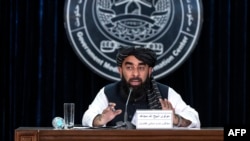The Taliban government in Afghanistan indicated Wednesday that it would consider releasing two U.S. prisoners in exchange for Afghans held in the United States.
Zabihullah Mujahid, the chief Taliban spokesman, told reporters in Kabul that the idea of a prisoner release was discussed in his meeting with U.S. officials in Doha, Qatar this week, just as the two sides brought it up it in their previous meetings.
“Afghanistan's conditions must be met. We have our citizens who are imprisoned in the U.S. and Guantanamo,” Mujahid stated. “We should free our prisoners in exchange for them. Just as their prisoners are important to America, Afghans are equally important to us,” he added.
The spokesman did not share any details about Afghan detainees, including those being held at the U.S.-run Guantanamo Bay prison in Cuba.
Mujahid spoke in the Afghan capital shortly after returning from Doha, where he led a Taliban delegation at a rare two-day U.N.-hosted meeting with international envoys on Afghanistan, which ended on Monday.
U.S. officials also attended the U.N. conference in the Qatari capital.
On Tuesday, a State Department spokesperson in Washington confirmed that U.S. special envoys on Afghanistan Thomas West and Rina Amiri met Taliban representatives in Doha.
“So during these meetings, special representative West pressed for the immediate and unconditional release of U.S. citizens unjustly detained in Afghanistan, noting that these detentions impede progress in the Taliban’s own desire for international recognition,” Vedant Patel told reporters.
The Taliban say the two Americans are among “several foreign nationals” currently imprisoned in Afghanistan for allegedly violating local immigration and other laws.
U.S. officials and relatives have identified one of the detainees as Ryan Corbett, while the identity of the second person has not been disclosed.
Corbett was taken into custody in August 2022, a year after the fundamentalist Taliban returned to power in Kabul following the withdrawal of U.S.-led Western troops after nearly 20 years of involvement in the Afghan war.
Corbett’s family and U.S. lawmakers have repeatedly urged U.S. President Joe Biden’s administration to do more to secure his safe and early release. Since his detention, Corbett has been able to call his wife and their three children.
Corbett and his family had lived in Afghanistan for years before being evacuated during the August 2021 Taliban takeover. He ran and supervised humanitarian projects for nongovernmental organizations, focusing on health and education.
Corbett returned to Afghanistan twice in 2022 and was detained by the Taliban on his second trip but has not been charged with any crimes, according to his family.
Relatives and activists say a third U.S. national, Mahmood Habibi, is also among foreigners in custody, but the Taliban refuse to acknowledge that they are holding him.
In March, a resolution was submitted to the U.S. House of Representatives calling for Habibi’s immediate release. The resolution, which was referred to the Committee on Foreign Affairs, stated that Habibi was arrested in August 2022 outside his home while in the country for business.
He was detained by the Taliban intelligence agency on suspicion of being involved in a U.S. drone strike that killed Ayman al-Zawahiri, the fugitive al-Qaida network chief, in Kabul.
The Taliban protested the strike, saying it was a breach of the 2020 Doha agreement they signed with the U.S., which paved the way for Washington to withdraw from the longest U.S. war in history.
The former insurgent group also pledged in line with the terms of the agreement not to harbor transnational militant groups, including al-Qaida, seeking to attack America and its allies.
No country has recognized the Taliban government, citing human rights concerns and bans on Afghan women’s access to education and work.
The U.N. meeting in Doha was aimed at increasing, facilitating, and coordinating the world’s engagement with the Taliban in the wake of deepening economic and humanitarian troubles facing war-torn, impoverished Afghanistan.
The two-day session ended without the Taliban making any pledges to remove their restrictions on women or winning concessions from the international community.
"Afghanistan cannot return to the international fold or fully develop economically and socially if it is deprived of the contributions and potential of half its population,” Rosemary DiCarlo, U.N. undersecretary-general for political and peacebuilding affairs, told reporters at the end of the meeting on Monday. She presided over the gathering on behalf of U.N. Secretary-General Antonio Guterres.
Mujahid, while speaking in Kabul Wednesday, reiterated that their rules about women are an internal Afghan matter and said foreign nations or organizations have nothing to do with it.







